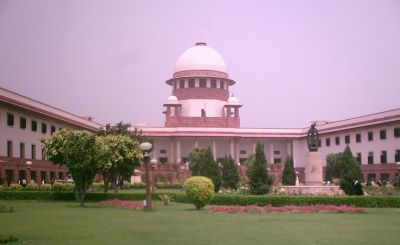Context:
The recent landmark ruling by a seven-judge Bench of the Supreme Court has brought to light the intricate relationship between legislative privilege and the accountability of lawmakers in India. At the heart of the matter lies the question of whether Members of Parliament (MPs) and Members of Legislative Assemblies (MLAs) are immune from prosecution when it comes to acts of bribery aimed at influencing their votes or speeches within the legislature. This issue has been a subject of legal debate, with constitutional provisions seemingly providing protection to lawmakers, while ethical considerations demand transparency and integrity in the democratic process.
Constitutional Provisions and Historical Context:
Article 105(2) of the Indian Constitution grants MPs immunity from prosecution in relation to anything said or any vote given in Parliament or parliamentary committees. Similarly, Article 194(2) extends protection to MLAs within their respective Legislative Assemblies. This immunity, rooted in the principles of parliamentary privilege, is designed to foster an environment conducive to robust debate and deliberation, shielding lawmakers from external pressures that may hinder their ability to represent their constituents effectively.
The legal landscape surrounding legislative privilege underwent scrutiny in light of the 1998 P.V. Narasimha Rao ruling, stemming from the infamous 1993 JMM bribery case involving former Union Minister Shibu Soren. In this case, the majority opinion favored a narrow interpretation of constitutional provisions, emphasizing the preservation of parliamentary participation and debate over stringent accountability measures for alleged acts of bribery. However, this ruling has been challenged in recent times, prompting a reevaluation of the delicate balance between legislative immunity and the imperative of ethical conduct among lawmakers.
Case Analysis:
The recent case involving Sita Soren, a member of the Jharkhand Mukti Morcha (JMM), brought to the forefront the issue of legislative immunity in the context of bribery allegations. Soren was accused of accepting a bribe to cast her vote in a particular manner during the Rajya Sabha elections of 2012. The subsequent legal battle saw Soren invoking Article 194(2) as a shield against prosecution, raising fundamental questions about the scope and limitations of legislative privilege in the face of criminal charges.
The Supreme Court's deliberation on this matter underscored the principle that legislative immunity does not extend to acts of bribery committed by lawmakers. Chief Justice Chandrachud elucidated the purpose of Articles 105 and 194, emphasizing their role in facilitating meaningful debate and decision-making within the legislature. However, he emphasized that such privileges are not absolute and should not serve as a refuge for misconduct such as bribery, which undermines the integrity of the democratic process. This ruling marks a significant departure from previous interpretations, signaling a shift towards greater accountability and transparency in legislative affairs.
Legal Interpretation and Implications:
The court's ruling articulated a nuanced approach to the concept of legislative privilege, highlighting the distinction between legitimate parliamentary functions and criminal conduct. By emphasizing the need for a functional relationship between the claimed privilege and the essential duties of a legislator, the court sought to prevent abuse of immunity for nefarious purposes such as bribery. This interpretation not only aligns with the principles of justice and accountability but also reaffirms the judiciary's role in upholding the rule of law within the legislative sphere.
Moreover, the court's clarification regarding the jurisdictional overlap between parliamentary disciplinary measures and criminal prosecution serves to delineate the respective roles of the judiciary and the legislature in addressing misconduct by lawmakers. By affirming its authority to prosecute criminal offenses independently of parliamentary proceedings, the court reinforces the principle of checks and balances essential to a functioning democracy. This ensures that lawmakers are held accountable not only to their peers but also to the broader legal framework governing public conduct.
Broader Ramifications and Future Outlook:
The implications of the Supreme Court's ruling extend beyond the immediate case at hand, impacting the broader landscape of Indian democracy. By rejecting blanket immunity for acts of bribery, the court has set a precedent that reinforces the primacy of ethical conduct and integrity in public office. This decision sends a clear message that no individual, regardless of their position or privilege, is above the law, thereby bolstering public trust in democratic institutions.
Looking ahead, the ruling is likely to catalyze legislative reforms aimed at strengthening mechanisms for preventing and addressing corruption within the political sphere. Greater transparency and accountability measures may be instituted to safeguard the integrity of electoral processes and uphold the principles of democracy. Ultimately, the court's intervention serves as a vital safeguard against the erosion of democratic values, reaffirming India's commitment to the rule of law and good governance.
In conclusion, the Supreme Court's recent ruling on legislative immunity and bribery charges represents a significant milestone in India's legal and political landscape. By affirming the principle that lawmakers are not immune from prosecution for acts of bribery, the court has upheld the principles of justice, accountability, and transparency essential to a vibrant democracy. This decision underscores the imperative of ethical conduct among elected representatives and reinforces public trust in democratic institutions. Moving forward, it is incumbent upon lawmakers, policymakers, and civil society to build upon this precedent and enact meaningful reforms to strengthen India's democratic fabric.
|
Probable Questions for UPSC Mains Exam 1. Examine the constitutional provisions and historical context surrounding legislative immunity in India. Discuss the significance of the recent Supreme Court ruling on immunity from prosecution for lawmakers accused of bribery, and its implications for the democratic process. (10 marks, 150 words) 2. Critically analyze the Supreme Court's interpretation of legislative privilege in the context of bribery charges against Members of Parliament and Legislative Assemblies. Assess the potential impact of this ruling on the accountability mechanisms within the Indian legislature and the broader implications for ensuring transparency and integrity in public office. (15 marks, 250 words)
|
Source – The Hindu








